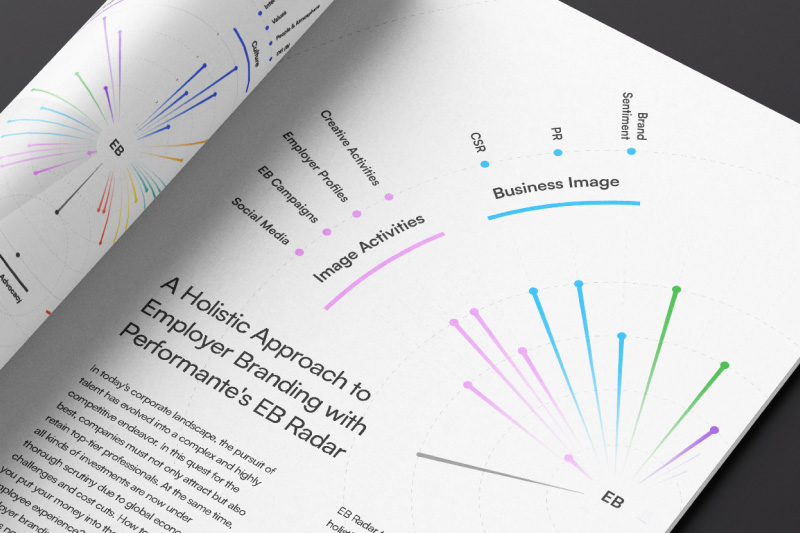There is no one-size-fits-all approach to Employer Branding. It should always be approached by context or insight, for example, the behavior and motivations of a particular generation in the labor market. Effective communication that considers each generation allows organizations to attract quality candidates and build an engaged community around the employer brand.

Who is Generation Y?
These are people born between 1982 and 1995 (dates may vary according to sources). But remember that generational profiles are always created based on those born in the middle of a generation, so people born on cut-off dates could identify with two generations at the same time. The ones born between 1977 and 1980 may have Generation Y and Generation X characteristics, while people born between 1993 and 1998 are similar in their behaviors, needs and motivations to Generation Y and Generation Z.
Generation Y is most referred to as the Millenials, as their representatives entered adulthood in the years around the entrance of the millennium. As early as 1994, The New York Times drew attention to what it called ‘millennial thinking,’ which it called an over-appreciation of new technology. A burgeoning culture marked by a ‘pursuit of the outer edge of computer technology’ was compared to the social revolution of the 1960s. Millennials grew up in a time of rapid technological development, and it was undoubtedly the widespread access to new advances that influenced their perception of the world and relationships.
Millennials stand out for their self-confidence, orientation to performance, high ambition, open-mindedness, self-assurance, and entrepreneurship. Their constant willingness to develop allows them to acquire high competencies. Representatives of Generation Y are looking for challenges at work that enable them to fulfil their professional ambitions. Their traits have made them an ambitious and persistent group in the labour market.
Generation Y at work — what makes employer brands interesting for Millennials?
Millennials mostly expect concrete and regular feedback, opportunities for development and appreciation of their work. Generation Y is much more willing to change jobs than previous generations, even if this is combined with a change of residence. Millennials are not driven by borders when thinking about their careers — as many as 71% of PwC respondents state that they plan to work abroad at some stage in their careers. On the other hand, it should not be forgotten that work-life balance is an essential aspect of life for the representatives of generation Y, for whom work and ambition do not have to be the only meaning of life.
How to attract Millennials to the workplace?
Certainly, they will pay attention to the talent development programme, career paths, issues management and work-life balance. Examples of content that people of generation Y may pay attention to in this context are case studies of individual employees (if their dynamic development took place within the structures of a particular, single organization), in-depth descriptions of promotion paths available in internal communication and the availability of tools facilitating work-life balance. The Gallup report points out that, for Millenials, earnings are not the most important thing but a sense of meaning and fulfilment in the workplace. What is important to them is the narrative of the workplace — collaboration rather than fulfilling a framework of rigid responsibilities.
Where can Generation Y representatives be found?
Almost 100% of millennials use the internet, which means that online channels are the best ways to reach this generation. The rate is higher than that of the younger generation in the labor market — Generation Z. Millenials make up the largest multi-network in social media. The most significant percentage of millenials have accounts on Facebook (88%) and YouTube (87%) — not surprisingly, after all, these two platforms are responsible for the Internet revolution that took place while they were growing up. In third place in terms of accounts is Facebook Messenger (79%). Outside the podium are Instagram (76%), WhatsApp (76%), Twitter (64%), LinkedIn (47%), Snapchat (43%), Pinterest (41%), and WeChat (30%).
However, the number of accounts owned does not equal the frequency of content consumption on each channel. Generation Y women are most likely to choose Instagram, followed by WhatsApp, with Facebook closing the podium. Men, on the other hand, are most likely to use Facebook, with WhatsApp coming in second again and Instagram in third place. It is easy to conclude that Facebook and Instagram are the channels to consider when planning image or recruitment campaigns.
What kind of online content do millennials consider interesting?
This generation has grown up with the changing, evolving internet. They can distinguish which content is more engaging and attractive and which is less so. They pay attention to content, quality and expertise, resulting from their desire for constant development and familiarity with quality content. One marketing technique that, in the case of millennials, can help capture their attention is storytelling. Generation Y are used to listening to different stories and becoming attached to fictional characters. Storytelling ramps up the quality of content and increases audience engagement. Be sure to pay attention to this when creating assets for a campaign, planning a recruitment or branding video script, or creating an expert podcast series.
Video is the most engaging content on the internet — but in the context of generations, this type of content is most often consumed by the youngest generation in the labour market — Generation Z. In the second place, however, are users between the ages of 25 and 34, who can be categorized as millennials. As many as 6 in 10 millennials prefer to watch a corporate video than read a newsletter. By contrast, 1 in 2 Generation Y representatives will only read an email they have received from an organization if it contains a video. The above statistics don’t lie — video is the format that is best and most readily absorbed by millennials. This is supported by the fact that up to 76% of the generation’s representatives ‘follow’ companies they like on YouTube. Certainly, podcasting is also worth considering as a quality type of content — millennials are the most likely to consume this type of content. Representatives of generation Y rank first in terms of weekly consumption of podcasts — 43% of the generation listens to them regularly!
What kinds of podcasts are interesting to millennials?
44% of the generation is more willing to believe and trust a stranger. Why are these statistics interesting in the context of content? We trust strangers whom we consider to be experts on a given topic. Access to the internet has led millennials to seek answers to their questions right in the online world. A company’s technology, marketing or talent management podcast can attract candidates to an organization and help build its image.
Communicating with the millennials: What should not be forgotten?
The communication structure with Generation Y should include all the aspects most important to the generation concerning their motivations and needs. Expert content that supports self-development draws attention to work-life harmony, reinforces their already high ambitions and promotes self-confidence. Entrepreneurship can also attract the attention of this unique audience. At the same time, the high quality of the content, its naturalness and the appropriate diversification of content between the most engaging formats cannot be forgotten. When creating content, focus on its factual and visual value, try to interact individually with the user and remember the legitimate message, which should reflect the real situation and the look of your organization from the inside.





